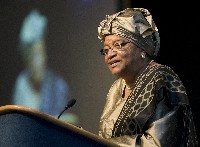c. 2008 Religion News Service
FORT WORTH, Texas _ Once the epitome of Main Street U.S.A., the United Methodist Church is rapidly becoming an increasingly international family.
Put another way: The church of President Bush and Sen. Hillary Clinton is also the church of Liberian President Ellen Johnson Sirleaf.
And as the Liberian president stood before thousands of fellow Methodists gathered here Tuesday (April 29), she presented herself as the personification of the church’s global missions and urged a renewed effort to fight poverty in Africa.
Sirleaf, who in 2006 became Africa’s first democratically elected female head of state, pointed to Methodists’ centuries-old health and education ministries in her West African nation. Methodists built the first secondary school in Liberia, the College of West Africa, of which Sirleaf called herself a proud alumna.
“For more than 175 years, you, the Methodist Church, has stood by and with the Liberian nation,” Sirleaf said. “The church must continue to work to assist us meet the challenges for the people of Liberia.”
Challenges are abundant across the world, Sirleaf said. A widening gap between rich and poor nations threatens regional stability; climate change threatens natural resources; and rising food prices threaten to unleash a tide of hunger across the world.
“You are meeting at a critical moment in the history of the Christian church and the human family,” she said.
Indeed, the nearly 4,000 United Methodists gathered here at their quadrennial General Conference find themselves in the middle of an intense debate about exactly how their church can reflect its increasingly international family.
While Methodist congregations shrink in the U.S., they’re booming in Africa and Asia _ 30 percent of the 11.5 million-member church now lives outside the U.S. Sirleaf’s Liberia has 168,000 Methodists; earlier this week delegates formally received its West African neighbor, Cote d’Ivoire, into the church. With 700,000 members, it’s now the church’s largest regional conference.
More than 275 of the nearly 1,000 delegates gathered here to draw up church policy are from Africa, an increase of 100 from the last General Conference in 2004.
Still, Methodist have yet to decide how to fully reflect their diversity in church governance. On Monday, delegates scuttled a plan that might have given more influence to churches in Africa, Asia and Europe, instead deciding to study the matter further and report back in four years.
The meeting here, which continues through Friday (May 2), also reflects a wider struggle for the soul of America’s mainline churches, as conservatives and liberals increasingly cross national and hemispheric lines in search of allies.
Liberal Methodists here say a conservative coalition also crossed ethical lines last week when they handed out more than 200 free cell phones to delegates from Africa and the Philippines. The giveaway sparked charges of racism, neo-colonialism and old-fashioned graft.
Conservative activist Mark Tooley of UMAction, a member of the coalition, called the cell phone brouhaha “very silly” and said that other church groups traditionally hand out items at the General Conference.
“I think a number of liberals are uncomfortable with the African church because they realize the African church is in a very different place from them and it’s the only significantly growing part of the church,” he said.
But the Rev. Troy Plummer of the gay-friendly Reconciling Ministries Network says there’s more to the cell phone giveaway. He noted that the fliers advertising the giveaway called on delegates to elect a slate of conservative candidates to the Methodist Judicial Council _ the church’s supreme court.
“I think what it reflects is the crass manipulation of people to forward your own political agenda,” Plummer said.
On Monday, those candidates lost. Delegates elected church moderates and liberals instead.
KRE/PH END BURKE





